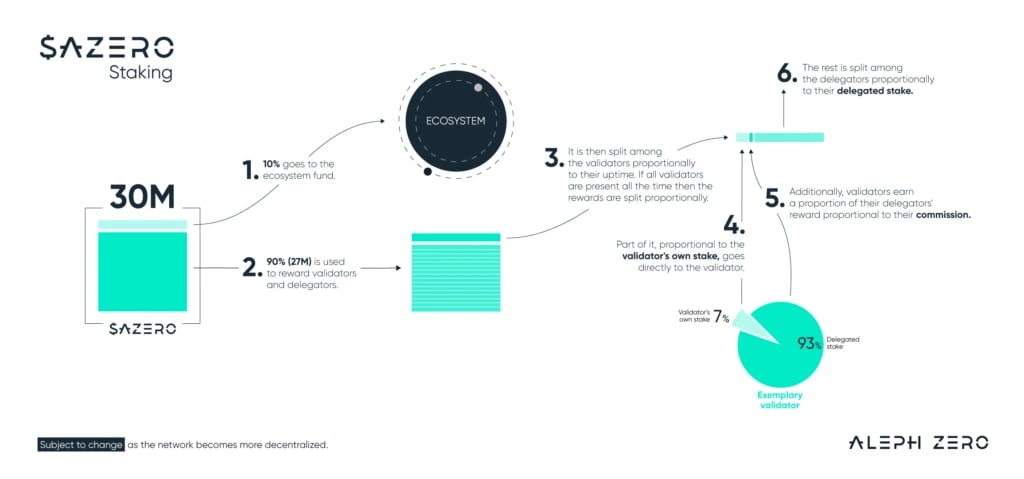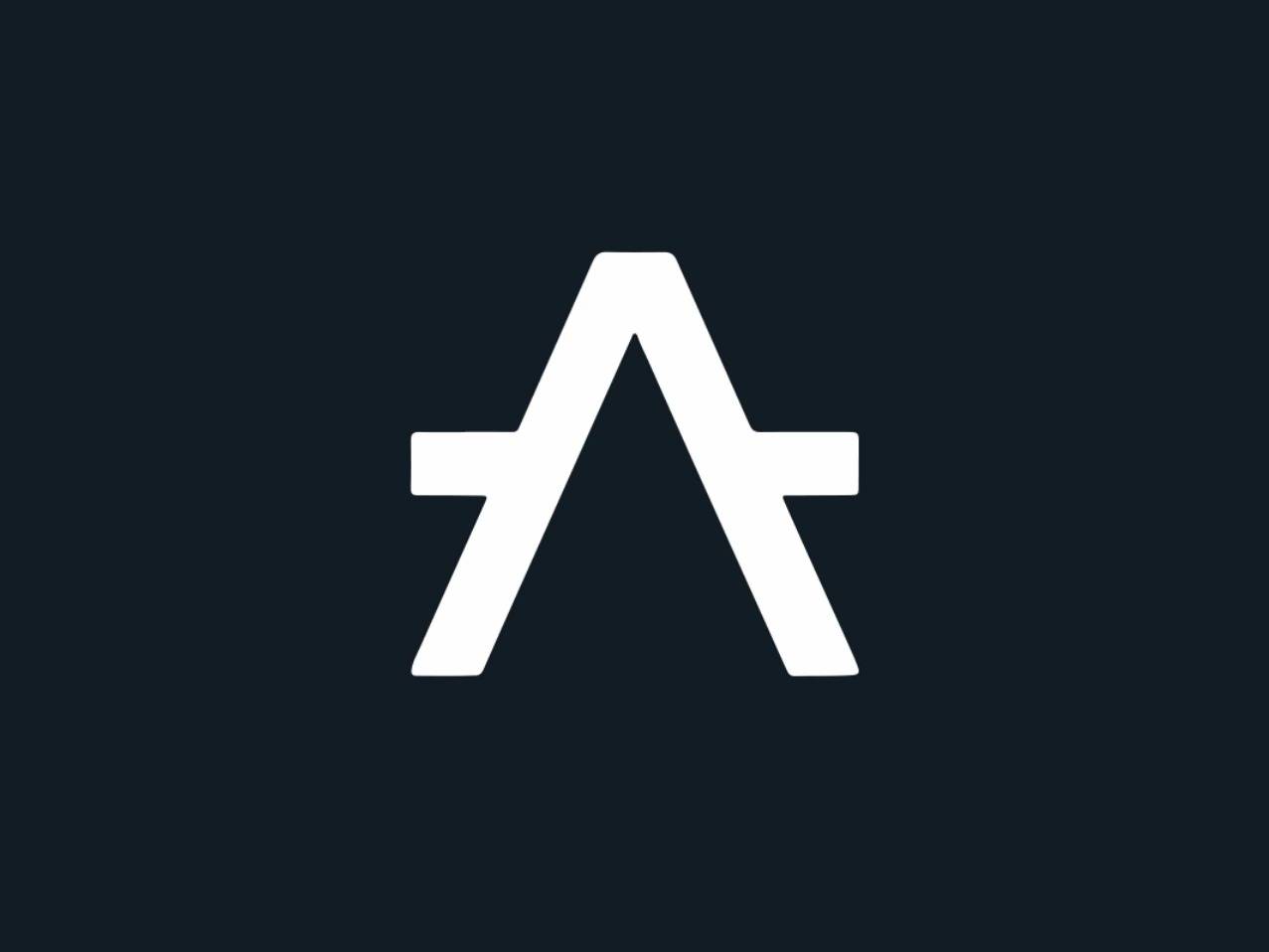Aleph Zero
Aleph Zero is a privacy-enhancing public blockchain integrated with the Substrate stack. It addresses the limitations of existing distributed ledger technology platforms by providing improved speed, validation time, scalability, and security. It was founded in 2018 by co-founders Adam Gagol, Antoni Zolciak, Matthew Niemerg, and Michal Swietek. [1]
Overview
Aleph Zero is a public blockchain that uses a custom algorithm leveraging Directed Acyclic Graph (DAG) technology to create an efficient and decentralized system. It improves upon current distributed ledger technologies by offering fast validation times, scalability, and enhanced security. The platform employs a "hub and spoke" model, allowing businesses to interact on a decentralized ledger while maintaining private networks. Aleph Zero demonstrated high performance in tests, achieving 416 millisecond validation times for 89,600 transactions per second using AWS nodes. The blockchain integrates zero-knowledge proofs (ZKPs) and secure multi-party computation (sMPC) to ensure data security and privacy. Aleph Zero aims to enable SMBs and enterprises to communicate efficiently while benefiting from decentralization. [1]
Technology
AlephBFT Consensus
The code behind the Aleph Zero blockchain is AlephBFT, a peer-reviewed consensus protocol presented at the Advances in Financial Technologies (AFT) 2019 conference. Aleph Zero uses a modified Proof of Stake (PoS) consensus algorithm alongside Directed Acyclic Graphs (DAG). Like other PoS blockchains, a rotating committee of validators determines the blockchain's state. DAGs enable faster transaction speeds, higher throughput, and significantly lower transaction fees, making the technology cost-effective and suitable for mass adoption. [2]
Shielder
The Aleph Zero Shielder is a smart contract that leverages zk-SNARKs technology on Aleph Zero. It aims to facilitate private payments and interactions within DeFi, contrasting with regular blockchains' transparency, allowing tracking of all user interactions. By utilizing zk-SNARKs, the Shielder enhances privacy by preventing third-party observers from linking different actions of the same user. This modular shielded pool allows for depositing and withdrawing PSP-22 tokens into a common shielded pool. Users within the Shielder are assigned secret identifiers called ZK-IDs. Additionally, it supports an optional Registrar responsible for registering new users by whitelisting their ZK-IDs and an optional Anonymity Revoker empowered to deanonymize specific users under special circumstances. The Shielder also facilitates shielded transfers securely, ensuring that transfers are only considered complete once claimed by the recipient. Furthermore, it supports ZK-plugins, which are auxiliary programmable logic modules that operate on secret data stored on shielded accounts. [3]
MOST
Introduced in September 2023, MOST is the bridge connecting Aleph Zero and Ethereum, facilitating the seamless movement of external liquidity and stablecoins to Aleph Zero while fostering DeFi growth on-chain. Designed for accessibility, MOST provides a user-friendly solution for asset transfers between Ethereum and Aleph Zero. As a guardian-based bridge, each guardian oversees two instances of the setup for Testnet and Mainnet, with eight guardians ensuring decentralization. Guardians wield governance keys for both networks, enabling actions like committee changes and contract upgrades. Key features include reduced fees for bridging native ETH, stablecoins, and tokens from Ethereum to Aleph Zero, incentivizing liquidity attraction to the ecosystem. External audits will ensure the highest security standards upon completion. The name "MOST" originates from its meaning of "bridge" in several Slavic languages, including Polish, Czech, Slovak, Slovenian, Croatian, Serbian, and Bulgarian. [4]
Liminal
As an extension of Aleph Zero, Liminal enhances security and privacy while acting as a gateway to various blockchains. It facilitates transactions between platforms linked to Aleph Zero, such as Ethereum, Near, Kusama, Cosmos, and Binance Smart Chain. Liminal employs innovative security measures combining zero-knowledge proofs (ZK-SNARKs) and Secure Multiparty Computation (sMPC). ZK-SNARKs enable one party to produce concise proof convincing another party of correct computations without revealing personal data. On the other hand, sMPC keeps sensitive information off-chain across multiple nodes, accessible only through a secure handshake. While ZK-SNARKs handle basic transfers, sMPC implements a global private state, such as decentralized exchanges, ensuring that transaction values remain concealed. Liminal's hybrid approach ensures robust security and anonymity for client data. [5]
aScan
aScan is a comprehensive token explorer tailored for the Aleph Zero ecosystem, specifically focusing on PSP-22 tokens. PSP-22 is Aleph Zero's equivalent of the ERC-20 standard on Ethereum, enabling the creation of fungible tokens that are versatile, secure, and easily integrated into the ecosystem. By offering detailed insights into each PSP-22 token, including total supply, contract addresses, transaction history, and holder information, aScan ensures transparency for users and provides developers with a platform to effectively showcase their projects. The platform also provides real-time transaction updates, allowing users to monitor token movements and assess network health. [6]
AZERO
The AZERO coin follows an inflationary model, with an annual release of 30 million coins as staking rewards and an infinite predicted supply. AZERO is the foundational currency within the Aleph Zero ecosystem, supporting various essential operations. Users can leverage AZERO to discount swap fees on the Common Decentralized Exchange (DEXs), reducing transaction costs. Additionally, it offers discounts on fees for asset-wrapping and usage of the Liminal Bridge, facilitating seamless asset transfers. Furthermore, AZERO is collateral for wrapped assets in Liminal, enhancing liquidity and security. Moreover, users can engage in validator node staking, contributing to the network's stability and security while earning rewards. There's no mechanism to burn AZERO coins, but the ecosystem is open to implementing one as it evolves. [7][8]
Tokenomics
Aleph Zero has allocated 23% of its tokens to the Aleph Zero Foundation and 10% to the team. The Foundation plans to allocate most of its tokens (approximately 70 million) towards research and development, marketing, operations, ecosystem incentives, and other expenses, with a significant portion reserved for the ecosystem fund. In later stages, the community will have a say in non-core spending from the treasury. [7]
As for the team allocation, 80% of the coins will be locked for a year and vested over four years. During the pre-seed funding round of 2018, AZERO coins were distributed to contributors via Simple Agreement for Future Tokens (SAFT) at $0.04, with 50% unlocked at the Token Generation Event (TGE) and the rest vested for 15 months. The seed round saw 16,667% of coins distributed, with 71.42% unlocked at TGE and the remainder vested for 6 months. A special Early Community round distributed 5% of tokens, vested for 14-64 days after the mainnet launch. Finally, the public presale distributed 18.33% of the total token supply, with tokens vested for 12 months. [7]

Partnerships
Integrations
stc Bahrain
On April 16th, 2024, Aleph Zero forged an alliance with stc Bahrain, Bahrain's innovative Telecom operator. Known for its pioneering digital advancements, stc Bahrain aimed to enhance its Web3 initiatives through this collaboration with Aleph Zero. The partnership aimed to enrich the experiences offered to stc's customers. The initial phase involved stc Bahrain deploying validator nodes on Aleph Zero's network. Concurrently, Aleph Zero joined stc's Pearling Path initiative, a Web3 Launchpad Program to accelerate Web3 adoption in the Middle East. The initiative focused on integrating blockchain infrastructure to address regional challenges and foster economic growth. [9]
“stc Bahrain is delighted to welcome Aleph Zero as a Pearling Path Partner within our Web3 Launchpad Program. This collaboration brings us closer to establishing a secure and integrated digital ecosystem in the Gulf region. Aleph Zero brings invaluable privacy-enhancing technology and a scalable, decentralized network that resonates with our vision for a seamless digital future.” - Saad Odeh, stc Bahrain Chief Wholesale Officer.
Digital Euro Association
On February 13th, 2024, Aleph Zero joined forces with the Digital Euro Association (DEA). Headquartered in Frankfurt, Germany, the DEA specializes in stablecoins, central bank digital currencies (CBDCs), crypto assets, and other forms of digital money, with a particular emphasis on shaping the development of the private and public digital Euro. [10]
“We are thrilled to welcome the Aleph Zero Foundation into our network. Their significant contributions to blockchain technology fundamentally enhance the technical expertise within our community. This collaboration is another noteworthy step towards our goal of shaping the future of digital money with a focus on enhanced security, privacy and efficiency. Their commitment to a privacy-first approach aligns closely with our values and establishes them as an ideal partner.” - Dr. Jonas Gross, DEA Chairman.
